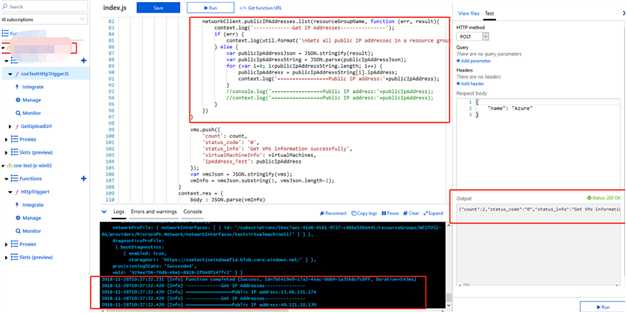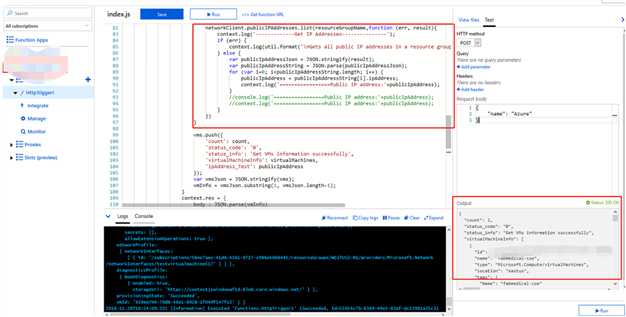Azure Function Runtime版本和IP输出格式问题
Posted wangsongshare
tags:
篇首语:本文由小常识网(cha138.com)小编为大家整理,主要介绍了Azure Function Runtime版本和IP输出格式问题相关的知识,希望对你有一定的参考价值。
Azure Function Runtime版本和IP输出格式问题
客户使用Function过程中,想获取IP格式的JSON输出,在不同Runtime版本,获取到的内容不同,这一块最后发现是需要调整一下代码就可以得到符合要求的JSON格式log输出。
- Runtime version: 1.0.12154.0 ,同样的代码可以获取到IP,可以输出Log,但不能得到JSON格式的输出。

- Runtime version: 2.0.12180.0,可以获取到IP,只是不能输出Log,但可以得到JSON格式的输出

- 关于此问题,定位到最后跟客户的代码使用方式有一定关系,一定要使用异步的方法,就可以使用Runtime 2.0版本得到IP log JSON格式输出
computeClient.virtualMachines.listAll(function (err, result) {
if (err) {
context.log(util.format(‘List all vms under the current subscription. \\n%s‘, util.inspect(err, { depth: null })));
var listVmErrorInfo = [];
listVmErrorInfo.push({
‘status_code‘: ‘1‘,
‘status_info‘: ‘Failed to list VMs.‘,
‘error_info‘: err
});
var listVmErrorInfoJson = JSON.stringify(listVmErrorInfo);
var vmInfo = listVmErrorInfoJson.substring(1, listVmErrorInfoJson.length-1);
// Added Section B
context.res = {
body : JSON.parse(vmInfo)
};
context.done();
//
}
else {
context.log(util.format(‘List all vms for the current subscription. \\n%s‘, util.inspect(result, { depth: null })));
var virtualMachinesJson = JSON.stringify(result);
var virtualMachines = JSON.parse(virtualMachinesJson);
var vms = [];
var count = ‘‘;
count = virtualMachines.length;
for (var i=0; i<virtualMachines.length; i++) {
virtualMachineName = virtualMachines[i].name;
VirtualMachineId = virtualMachines[i].id.split(‘/‘);
resourceGroupName = VirtualMachineId[4];
networkClient.publicIPAddresses.list(resourceGroupName, function (err, result){
context.log(‘-------------Get IP Addresses---------------‘);
if (err) {
context.log(util.format(‘\\nGets all public IP addresses in a resource group.:\\n%s‘, util.inspect(err, { depth: null })));
} else {
var publicIpAddressJson = JSON.stringify(result);
var publicIpAddressString = JSON.parse(publicIpAddressJson);
for (var i=0; i<publicIpAddressString.length; i++) {
publicIpAddress = publicIpAddressString[i].ipAddress;
context.log(‘=================Public IP address:‘+publicIpAddress);
}
//context.log(‘=================Public IP address:‘+publicIpAddress);
}
// Added Section A
vms.push({
‘count‘: count,
‘status_code‘: ‘0‘,
‘status_info‘: ‘Get VMs information successfully‘,
‘virtualMachineInfo‘: virtualMachines,
‘ipAddress_Test‘: publicIpAddress
});
var vmsJson = JSON.stringify(vms);
vmInfo = vmsJson.substring(1, vmsJson.length-1);
//
// Added Section B
context.res = {
body : JSON.parse(vmInfo)
};
context.done();
//
})
}
// Removed Section A
}
// Removed Section B
});
- 推荐用v2版本async/await 代替 callback patterns,V2 支持 async/await (with node v8 or v10), V1版本不支持。
basic sample translation:
module.exports = async function (context, req) {
if (1) {
// Declares variables
//login in azure using the service principal
try {
const authResponse = await msRestAzure.loginWithServicePrincipalSecret(clientId, secret, domain)
let credentials = authResponse.credentials;
let subscriptions = authResponse.subscriptions;
// success code with other
// This is the same as context.done()... see docs for details: https://docs.microsoft.com/azure/azure-functions/functions-reference-node
return;
} catch (err) {
// the "if err" code
var loginErrorInfo = [];
// ...
// etc.
// this is the same as context.done(err);
throw err;
}
}
}
- 最后大家遇到类似问题,可以直接建议客户使用如上方式解决。
以上是关于Azure Function Runtime版本和IP输出格式问题的主要内容,如果未能解决你的问题,请参考以下文章